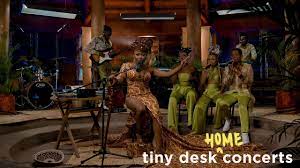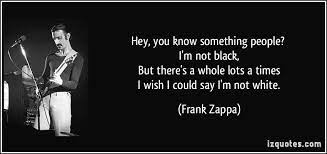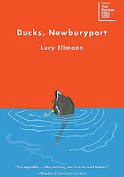 SOUNDTRACK: MESHELL NDEGEOCELLO–Tiny Desk (Home) Concert #167 (February 10, 2021).
SOUNDTRACK: MESHELL NDEGEOCELLO–Tiny Desk (Home) Concert #167 (February 10, 2021).
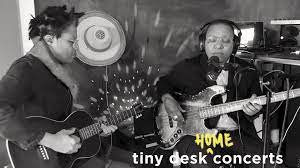 I bought Meshell Ndegeocello’s Plantation Lullabies back in 1993 on the strength of “If That’s Your Boyfriend,” a funky track that is still pretty great. I didn’t realize she had been steadily putting out music ever since.
I bought Meshell Ndegeocello’s Plantation Lullabies back in 1993 on the strength of “If That’s Your Boyfriend,” a funky track that is still pretty great. I didn’t realize she had been steadily putting out music ever since.
This Tiny Desk (home) concert … includes songs from throughout her career framed by her thoughts on the importance and influence of James Baldwin: “He deserves flowers every day. Most of all because he was willing to discuss things that were painful, hard to look at, hard to see, hard to accept.”
Ndegeocello is a bad-ass bass player with a serious funk edge. And yet in this Tiny Desk Concert, she strips almost all of that away.
The first song comes from Lullabies, but in this version of “Step Into the Projects” she strips away all the music and turns the song into a spoken word piece (although she does keep the rhythm of the original).
For the next three songs she is accompanied by her longtime guitarist Chris Bruce.
“Price of the Ticket,” is from Ndegeocello’s recent project, Chapter & Verse: The Gospel of James Baldwin, “a 21st century ritual toolkit for justice” inspired by Baldwin’s The Fire Next Time. In the track, it’s just Bruce’s gentle guitar and Meshell’s quiet voice.
“Forget My Name” from Comet Come To Me (2014) is stripped down from its original reggae arrangement and lays bare the haunting imagery in the lyrics.
She plays some spare bass, but musically it’s all about Bruce–the cool low riff and the pretty high melody.
“Fool of Me,” from her acclaimed album Bitter (1999), ends the set with just vocals and guitar.
Like the other songs, it is spare and beautiful, allowing you to really hear the words. I love Meshell’s funk, but this is a beautiful set.
[READ: March 29, 2021] Parable of the Sower [2026-2027 (chapter 19)]
I have not read Cormac McCarthy’s The Road, and I don’t intend to. But I feel like this book acts as a precursor to that one. And that is something I did not in any way expect.
2026 opens in June, almost seven months after the previous entry. I’m curious about the distance between entries. It’s possible that Lauren has dozens and dozens of pages that just said, “today sucked” and we don’t need to see that. But I am curious about the time jumps.
Is it a way for Butler to move us ahead quickly so that something that needed to take a few years to happen is given the time to do so? I’m thinking about Mars a bit. In two years a lot can happen with the space program. Of course, the President was supposed to cancel the program. So who knows what’s going on there. Aside from basic passage of time, did we need to wait six months to see what came next? I’m not sure.
In June Keith is back–bigger and more confident. He’s not yet 14, but he’s very successful, bringing home money and gifts (but none for his father). He has ingratiated himself into a gang by being the only literate one in the group:
They’re all older than me, but not one of them can read or write anything. They stole all this great stuff and they couldn’t even use it. Before I got there they even broke some of it because they couldn’t read the instructions. (105)
Lauren and Keith have a heart-to-heart–really their first ever. He learns a bit about her and while he gains a little more respect he also tells her that she’d never survive out there–she doesn’t know enough. He also tells her about these new crazies called Paints who paint their skin green or blue or yellow and eat fire and kill rich people.
Keith comes back on her birthday and gives her a present. A month later he is dead–killed in a horrific and gruesome way. He was clearly tortured and left to be found. His death was a message for someone–a rival gang, probably.
But they don’t call the police:
cops liked to solve cases by “discovering” evidence against whomever they decided must be guilty. Best to give them nothing. They never helped when people called for help. They came later and more often than not, made a bad situation worse. (114)
In October, a new component to the story crops up.
Kagimoto, Stamm, Frampton and Company (KSF) has taken over a nearby town called Olivar. It is small and well to do. The citizens voted to let their town be taken over–privatized. They intend to set up energy resources in the community–solar, wind, desalinization. They mean to own great industries in an area that people have given up on.
Kagimoto, Stamm Frampton: Japanese, German, Canadian. When I was young, people said it would come to this. Well why shouldn’t other countries buy what’s left of us if we put it up for sale. (121)
This is another aspect of the story that confuses me. Is it basically that Los Angeles has exploded and the rest of the country is okay? There’s talk about work up north, but why? What happened to the country that they/we would let L.A. collapse but nothing else. Or maybe it’s the entire South West? Nobody knows anything about the East Coast, apparently. I’m hoping that they will get explained a bit later on.
Olivar was accepting applications to live there. They were looking for educated people. And here we learn that both of Lauren’s parents have PhDs [a commentary on the invisibility of Black scholars?]. Her stepmother thinks it’s a great idea to go to Olivar. They would be guaranteed safety and security. But her father is against it, calling it “half antebellum revival and half science fiction” (122).
Anyone KSF hired would have a hard time living on the salary offered. In not very much time, I think the new hires would be in debt to the company. That’s an old company-town trick–get people into debt, hang on to them and work them harder. Debt slavery. That might work in Christopher Bonner’s America. Labor laws, state and federal are not what they once were. (121)
Come November, the Garfields have been accepted at Olivar. The Garfieds include Joanne, Lauren’s one time best friend (who misplaced Lauren’s trust by tattling to her father). Joanne has been serious with Harry Balter. But Harry is staying in Rebledo. Lauren suggests they get married and then Harry can move in with them, but she says that Harry wants to get married and travel north. He thinks they way Lauren’s father does about Olivar.
But the Garfields are still going: “conservative and sensible and mature and wrong” (128).
In November, Lauren’s father did not come home one night. They spend days looking for him with no luck. The search parties uncover all kinds of remains, some of which they think might be her father’s but which turn out not to be.
The search also reveals an aspect of Lauren’s hyperempathy that we didn’t know–sound doesn’t trigger it (she hears a man screaming), only sight does.
Five days alter they have a Sunday survive that turns more or less into a memorial. Lauren speaks at he service and proves to be powerful preacher. She speaks of God but presumably she means her own god–the earthseed god. By mid-December they have a formal funeral–they accept that he would have found his way home by now.
Later, when KSF came for the Garfields, it was in an armored truck
The two movers were a black and a white, and I could see that Cory considered that hopeful. Maybe Olivar wouldn’t be the white enclave that Dad had expected. (139)
All along Lauren has been romantically involved with Curtis. People anticipated that she would get married an have a baby with him–something she strongly resisted. Indeed, her plan all along was to leave Rebledo without him. But now with Lauren’s father gone (he was the reason she hadn’t left yet–she didn’t want to hurt him), Curtis suggests that they both go. He’s upset that she wanted to go without him, but she explains that she didn’t want to force him to make that choice.
Two days later, someone burned down the Payne/Parrish house; while that was going on. they robbed three of the other houses including Lauren’s.
I’ve been frightened at the phrases that Butler says that prove eerily prophetic to the last few years:
People are setting fires because they’re frustrated, angry, hopeless. They have no power to improve their lives, but they have the power to make others even more miserable. And the only way to prove to yourself that you have power is to use it. (143)
Interestingly, the drug that gave Lauren her hyperempathy–Paracetco–was initially a legitimate drug intended to help victims of Alzheimer’s disease. Pyro was an accident–a homebrew on the East coast it made it was away across the country.
People on the fire drug get off on watching things burn. Blaze, fuego, flash, sunfire. The most popular name is pyro short for pyromania [I’m fascinated that she needed to spell that out as I feel that in 2021 (and much earlier) it was a common abbreviation].
As the year ends, the families try to make due with what they have left.
Then we enter 2027. Once again it’s six months into the year. And this is when things change dramatically. Thieves drove a truck through their wall and set everything on fire. Nearly everyone in the community was killed. [I did wonder if it was worthwhile learning anyone’s names, and it was two people I didn’t think twice about who survived]. The description is a violent orgy of death, rape, fire and who knows what else. It is brutally described. Lauren escaped. She had the forethought to run back in and put on clothe and shoes and grab her bug out bag. No one else in her family had done so. She saw them n bare feet and pajamas and then she didn’t see them any more. She managed to get outside and to hide until the next day,
She crept back into her community and went to her house which was being looted and stripped. She knew where there were some hiding places and she managed to get clothes for her family as well as money that was hidden in the ground. She grabbed a gun and got out, looking like all the other miserable looters.
Lauren was sure she was alone. Then out of the rubble came Harry Balter and Zahra Moss–the youngest wife of Richard Moss the polygamist. Zahra’s baby was killed (brutally) and an attacker was about to (or had begun to) rape her when Harry saved her (and got beaten for his help). Neither one had planned for anything like this and they are pretty hopeless. Lauren decides that three is safer than one and invites them to go North with her.
Zahra’s backstory is interesting. Richard bought her from her mother who was a drug addict and a prostitute. Zahra has lived on the streets and she knows what’s what. She takes them to Hanning Joss, the biggest secure store complex. I’m fascinated to learn that there are are still megastores and that they have security allowing people to shop safely there–commerce always wins.
Then they do what everybody else does–they head North. Lauren has decided to pass as a man. She’s tall and muscular and can do so, so she cuts her hair short. They encounter much danger and violence but manage to get relatively far north. Harry is a trusting guy, trying to avoid violence in any way possible. But Lauren (and Zahra) knows the reality of the situation–kill or be killed; steal or be stolen from. And with Lauren’s hyperempathy, she can’t afford to let people around her suffer. She winds up cutting a man’s throat to stop the hurting that he (and she) are feeling. Harry is appalled at her. So she finally admits to her hyperempathy assuming they’ll abandon her. But they do not–three is better than two.
Zahra and Harry become a couple and have unprotected sex (what harm could come from that?)
Then the trio meet another family who seems to be tagging along after them. Everyone is out for themselves, but Lauren takes pity on this mixed race couple with a baby. She helps them out at the second Hanning Joss and a few days later, when Lauren saves their baby from a feral dog, they agree that five (or six) is better than three and two (or three).
The new people are Travis Charles Douglas, Gloria Natividad Douglas and six month old Dominic. They are going to Seattle where Travis’ aunt lives. Travis is quite taken aback when he learns that Lauren is a woman–especially since she saved them, but he’s going to have to get over it.
All of this time, Earthseed has been running around in Lauren’s head, but it hasn’t really shown up.
Then in chapter 18, Lauren starts talking to them about Earthseed. Travis is a (surprisingly) intelligent man–he knows about entropy.
Travis’s mother was a live in cook for a rich man. But before that she had written for newspapers and magazines. She taught Travis to read. The man she worked for had a library and she would sneak out one book at a time–he didn’t want Travis touching his stuff.
Of course. Slaves did that two hundred years ago. They sneaked around and educated themselves as best they could sometimes suffering whipping, sale or mutilation for their efforts. (218)
Natividad was a maid and the rich man let them marry: The son of the cook marrying one of the maids. That was like something out of another era too.
They discuss her poems–Earthseed. Travis pushes back against her ideas, although never in an aggressive way.
She argues that here is no pore pervasive power than change. Travis says that nobody is going to worship change. Lauren says she hopes not
This excerpt from God is Change summarizes this discussion nicely:
“I was looking for God. I didn’t know whether there was a god to find, but I wanted to know. God would have to be a power that could not be defied by anyone or anything.”
“Change.”
“Change, yes.”
“But it’s not a god. It’s not a person or an intelligence or even a thing. It’s just … I don’t know. An idea.”
“It’s a truth. Change is ongoing. Everything changes in some way— size, position, composition, frequency, velocity, thinking, whatever. Every living thing, every bit of matter, all the energy in the universe changes in some way.”
“Sort of like saying God is the second law of thermodynamics?”
“That’s an aspect of God. There are all kinds of changes in the universe.”
“But why personify change by calling it God? Since change is just an idea, why not call it that? Just say change is important.”
“Because after a while, it won’t be important. People forget ideas. They’re more likely to remember God— especially when they’re scared or desperate.”
“Your stuff isn’t very comforting.”
“It is after a while. I’m still growing into it myself. God isn’t good or evil, doesn’t favor you or hate you, and yet God is better partnered than fought.”
“Your God doesn’t care about you at all.”
“All the more reason to care about myself and others. All the more reason to create Earthseed communities and shape God together. ‘God is Trickster, Teacher, Chaos, Clay.’ We decide which aspect we embrace— and how to deal with the others.”
“But nobody’s going to worship change.”
“I hope not. Earthseed deals with ongoing reality, not with supernatural authority figures. Worship is no good without action. With action, it’s only useful if it steadies you, focuses your efforts, eases your mind.”
“Praying makes people feel better even when there’s no action they can take. I used to think that was all God was good for.”
“That isn’t what God is for, but there are times when that’s what prayer is for. And there are times when that’s what these verses are for. God is Change, and in the end, God prevails. But there’s hope in understanding the nature of God— not punishing or jealous, but infinitely malleable. There’s comfort in realizing that everyone and everything yields to God. There’s power in knowing that God can be focused, diverted, shaped by anyone at all. But there’s no power in having strength and brains, and yet waiting for God to fix things for you. Best to understand that and return the effort: Shape God.”
Lauren thinks he might join her movement. Zahra is already on board.
She imagines finding and isolated place on the coast and making a deal with the owners–if there were more of them and they were better armed, they could provide security as well as education.
This fantasy, this plan gives the first sign of hope in this bleak world of Lauren’s. It seems impossible.
Read Full Post »
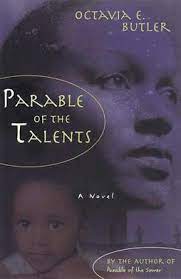 SOUNDTRACK: LUEDJI LUNA-Tiny Desk Meets AFROPUNK: #203/196 (May 2, 2021).
SOUNDTRACK: LUEDJI LUNA-Tiny Desk Meets AFROPUNK: #203/196 (May 2, 2021).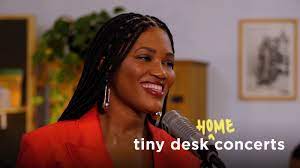 Tiny Desk Meets AFROPUNK was the opening event of AFROPUNK’s “Black Spring” festival. The virtual celebration, hosted by Jorge “Gitoo” Wright, highlighted outstanding talent in Afro-Latin and Afro-Caribbean music across the globe. Our showcase featured four artists who honored their homes and celebrated the art their heritage has inspired.
Tiny Desk Meets AFROPUNK was the opening event of AFROPUNK’s “Black Spring” festival. The virtual celebration, hosted by Jorge “Gitoo” Wright, highlighted outstanding talent in Afro-Latin and Afro-Caribbean music across the globe. Our showcase featured four artists who honored their homes and celebrated the art their heritage has inspired.


